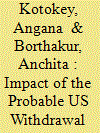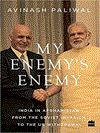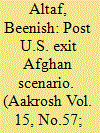| Srl | Item |
| 1 |
ID:
175997


|
|
|
|
|
| Summary/Abstract |
Afghanistan’s age old relationship with the newly declared union territory of Kashmir is mostly seen through the prism of dispute between Islamabad and New Delhi since several decades. Among courses of events between Afghanistan and Kashmir, the Soviet withdrawal from the former in 1989 brought remarkable changes not only in Afghanistan but the spill-over effects of withdrawal were also felt in the Kashmir valley.
|
|
|
|
|
|
|
|
|
|
|
|
|
|
|
|
| 2 |
ID:
179879


|
|
|
|
|
| Summary/Abstract |
The successful negotiation of the Paris Agreement, and its subsequent signing and adoption in 2016, marked a new landmark in global climate governance. However, the viability of the agreement was questioned particularly after the United States announced its withdrawal in 2017, pointing to certain institutional deficiencies in the overall agreement. The signing of the agreement would not have been possible without the initial joint commitment of both China and the United States, the world's two largest greenhouse gas emitters. Despite China's official claims of steadfast compliance with the agreement, the country's capacity to fulfil its commitment remains unclear. This study aims to first determine the constitutional deficiencies of the agreement that spurred America's withdrawal and the impacts. Second, it evaluates China's compliance capacity in the post-Paris Agreement era without America's involvement. The outcomes of this study provide some useful insights into preventing other countries from following the US example and better understanding China's position and capacity in keeping climate governance on the right track.
|
|
|
|
|
|
|
|
|
|
|
|
|
|
|
|
| 3 |
ID:
155844


|
|
|
|
|
| Publication |
Noida, HarperCollins Publishers, 2017.
|
| Description |
xviii, 381p.hbk
|
| Standard Number |
9789352772681
|
|
|
|
|
|
|
|
|
|
|
|
Copies: C:1/I:0,R:0,Q:0
Circulation
| Accession# | Call# | Current Location | Status | Policy | Location |
| 059216 | 327.540581/PAL 059216 | Main | On Shelf | General | |
|
|
|
|
| 4 |
ID:
118032


|
|
|
| 5 |
ID:
181491


|
|
|
| 6 |
ID:
145371


|
|
|
|
|
| Summary/Abstract |
Afghanistan has always played a very crucial role in the Asian and world politics and acted as playground for the ‘Great Game’. Due to its unique geographical location and presence of abundant natural resources, controlling of Afghanistan has been a long cherished dream for the colonial powers in the past. In the nineteenth century, Afghanistan served as a ‘strategic buffer’ state between Czarist Russian and the British Empire in the subcontinent. Afghanistan's relations with Moscow became more cordial after the Bolshevik Revolution in 1917.
|
|
|
|
|
|
|
|
|
|
|
|
|
|
|
|